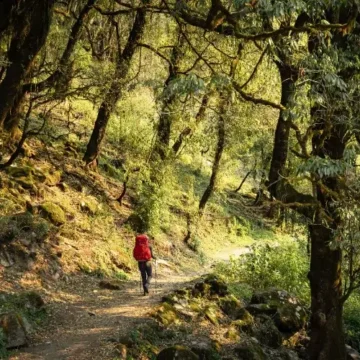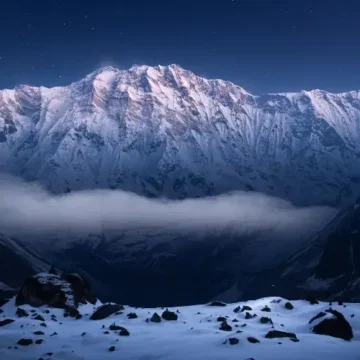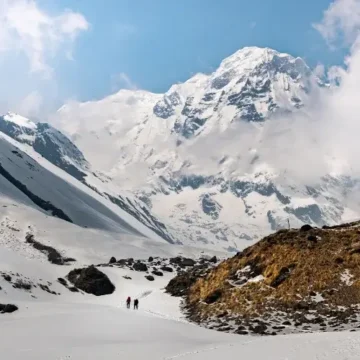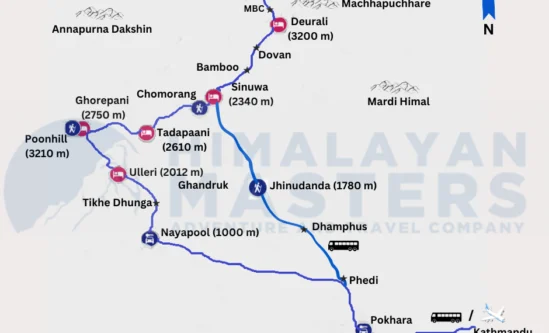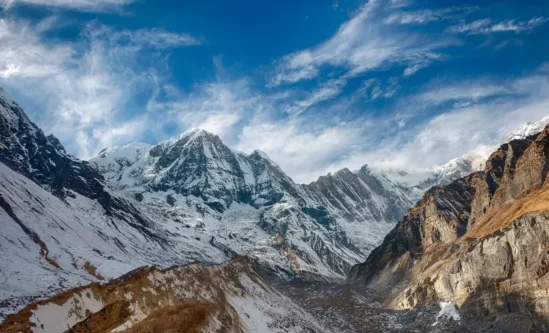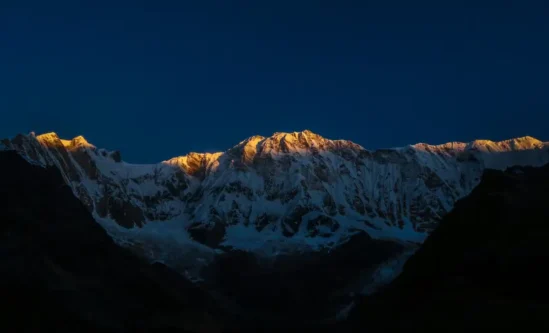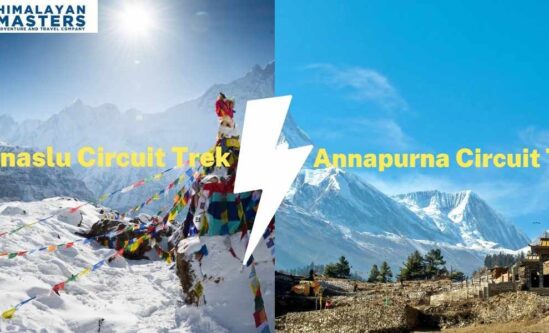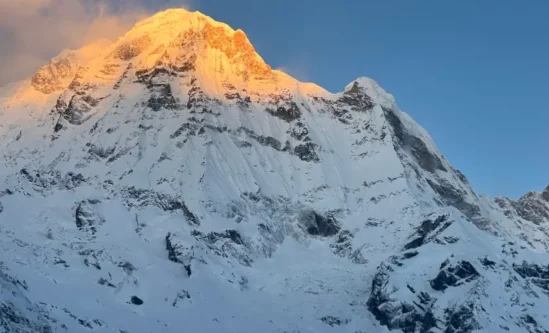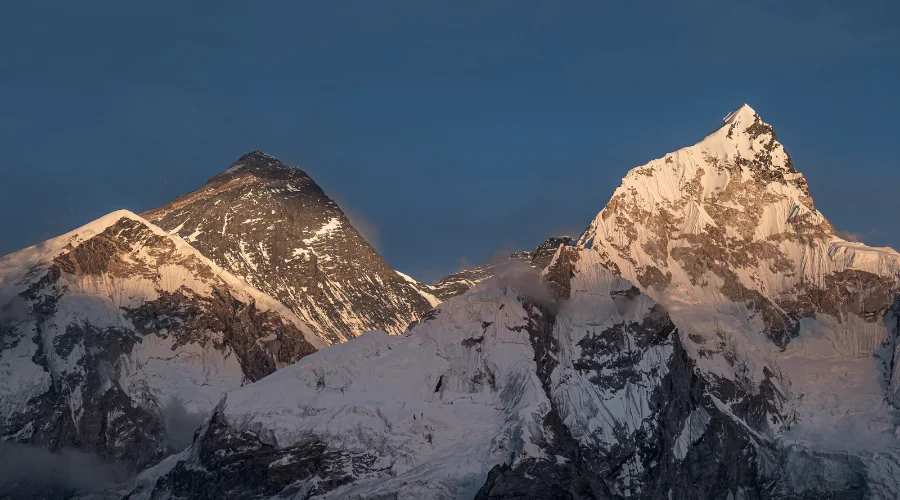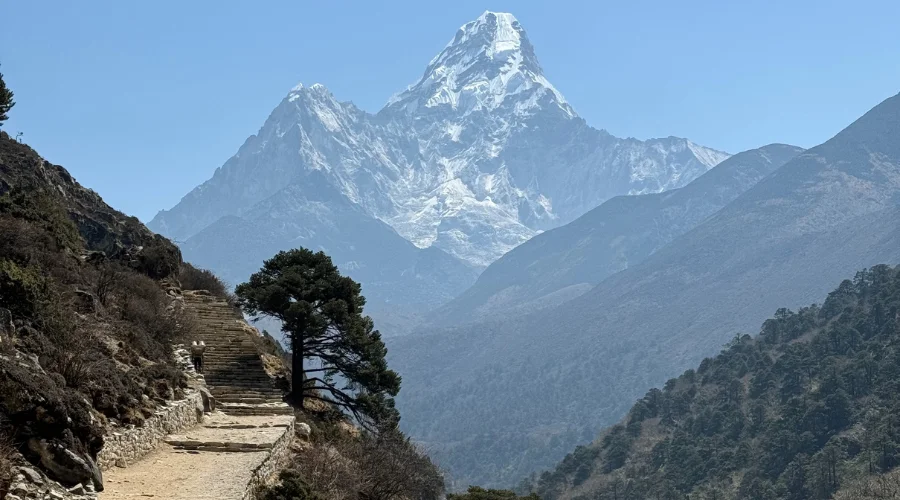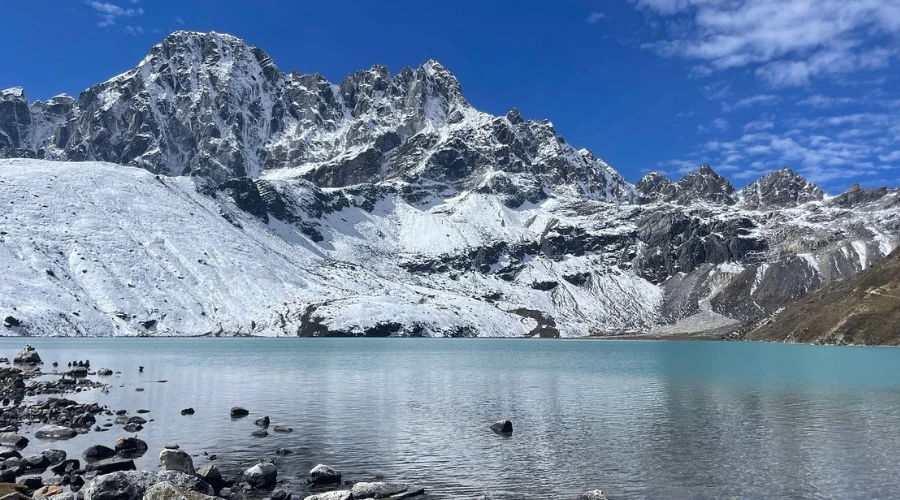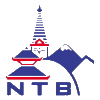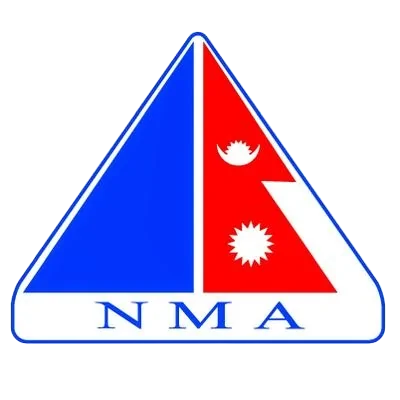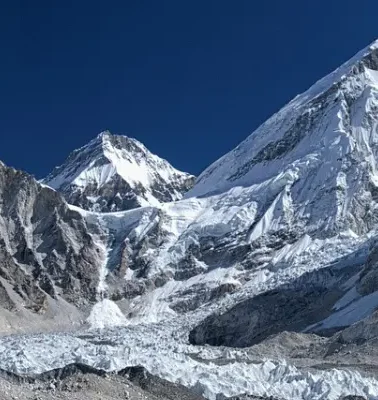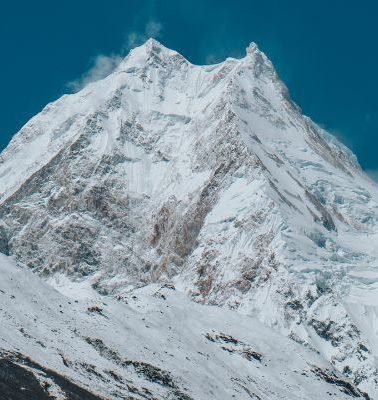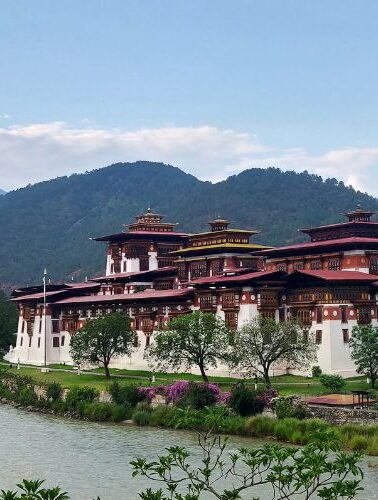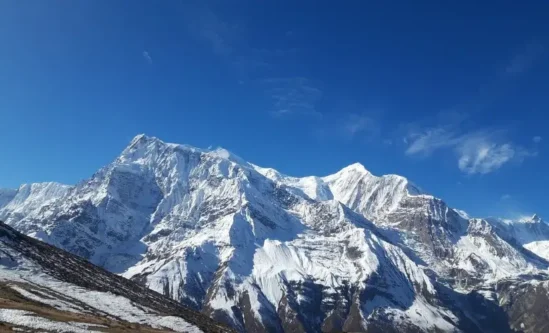
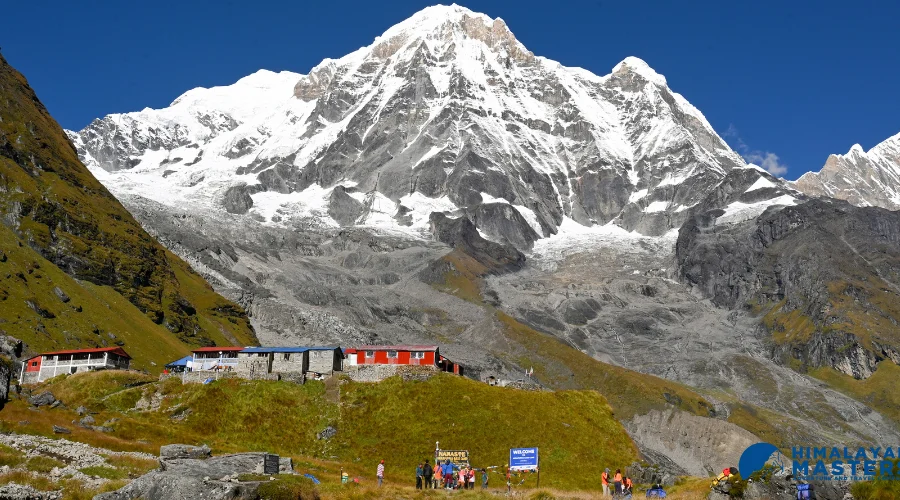
- TRIP DURATION
- 11 Days
- MAX. ALTITUDE
- 4130 m/13550 ft.
- TRIP GRADE
- Moderate
- LODGING
- Tea House
- BEST SEASON
- Spring & Autumn
- MEALS
- Breakfast, Lunch & Dinner
- COMMUNICATION
- Wi-Fi/ Local SIM Card
- PER DAY WALK
- 5 to 6 Hours
Annapurna Base Camp Trek, 11 Days
Annapurna Base Camp trek, popularly known as the Annapurna Sanctuary trek, is one of the most popular trekking trips in the Annapurna region of the Himalayas. The Annapurna Base Camp Trekking package is a golden opportunity for adventurous people who enjoy the beautiful Himalayas.
The Annapurna Base Camp (ABC) trek is a dream adventure for mountain lovers. You can witness 360-degree views of the Annapurna range, including Machhapuchhre, Nilgiri, Hiunchuli, etc. The natural beauty, sunrise views over snow-capped mountains, and picturesque landscapes will make this trip memorable.
You’ll walk through dense green forests filled with the pleasant smell of rhododendrons, spot wildlife, and see traditional villages where locals live in harmony with nature. These experiences keep you energized and happy throughout the trek.
Annapurna Base Camp Trek Overview
The ABC trek is more accessible and comfortable than other base camp treks, making it ideal for beginners.
The journey starts with a short 25-minute flight from Kathmandu to Pokhara and then a six—to seven-hour bus ride to Nayapul, where the trek begins.
Depending on your pace, you can complete the trek in 6 to 12 days, as you have to hike only 5 to 6 hours every day.
This trek attracts visitors throughout the year. It is a favourite among Thai, Malaysian, Chinese, and Indian tourists for its beauty and ease.
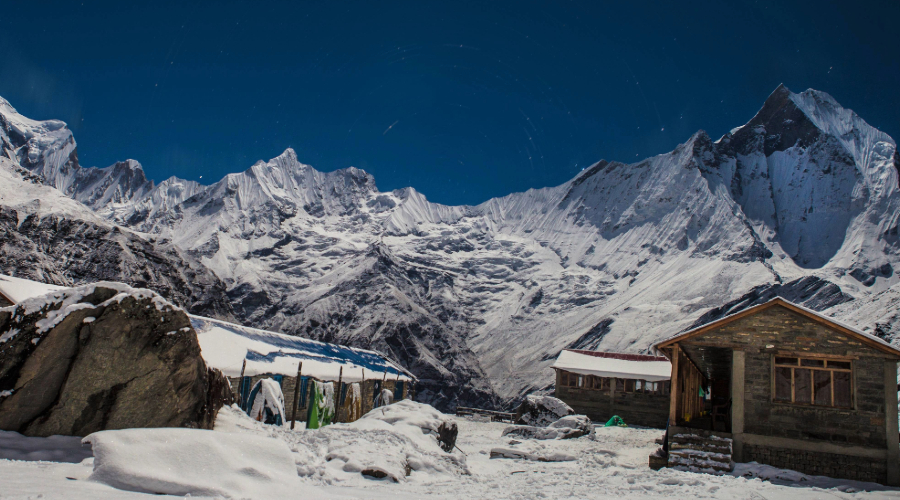
Trek Facts
- Duration of the trek is 6 to 12 days.
- The beginning point of the trek is Nayapool.
- The closing point of the trek is Jhinu Danda.
- Maximum elevation of Annapurna Base Camp is 4130 Meters/ 13549 Feet.
- Spring and Autumn are the best seasons to visit Annapurna Region.
- Accommodation: Teahouses/Guesthouses
- Transportation: Flight/Bus/Car/Taxi/Jeep
- Trek Category: Moderate
- Permits: TIMS and ACAP
Top Highlights of ABC Trek
- Able to simultaneously trek two base camps, Annapurna Base Camp and Machhapuchhre Base Camp.
- Learn about the unique cultures, traditions, and lifestyles of local people.
- 360-degree stunning view of Annapurna, Machhapuchhre, and Hiunchuli.
- There will be a hot spring shower at Jhinu Danda while returning.
- Enjoy the panoramic views seen from the base camp.
Documents for Booking ABC Trek
- A copy of your passport – for booking/confirming the trip
- A copy of your travel insurance before going on a trek.
- A copy of your flight ticket – for planning your trip accordingly
- Two passport-sized photos – for obtaining a special permit
- Emergency contact details
Culture and Wildlife on Annapurna Base Camp Trek
Annapurna Base Camp offers a unique and diverse experience of multi-ethnic culture and rich wildlife. Throughout the journey, you will be awed by the beauty of the scenery of majestic mountain peaks and their surroundings.
Landscapes:
The Annapurna region is home to several ethnic villages, such as Manang and Mustang, and the hidden valleys of Tsum and Nar Phu. These areas are known for their diverse wildlife and natural beauty.
During the ABC trek, you can also see one of the largest rhododendron forests in Ghorepani, explore the Kali Gandaki River, and visit Tilicho Lake, the world’s highest-altitude freshwater lake.
The region also offers stunning panoramic views of towering mountains, including Mount Manaslu, the 8th highest mountain in the world.
Peoples:
During the trek to ABC Nepal, you can interact with various ethnic communities, such as Gurung, Magar, Thakali, Manange, Loba, Brahmin, and Chhetri. Brahmin and Chhetri welcome you with their Hindu Culture, while the others represent themselves with Buddhist hospitality.
In summary, the trek is a perfect blend of cultural experiences with natural beauty.
Wildlife:
Due to infrastructure development, Wildlife sightings are becoming rare in the lower Annapurna region. However, in higher altitudes like Tsum Valley, if you are lucky enough, you might be able to see snow leopards, red pandas, Himalayan Tahr, gorals, pikas, Himalayan marmots, and various other smaller mammals.
Birds:
The area is home to numerous birds of prey and smaller birds like bulbuls, thrushes, parakeets, and cuckoos, making it a paradise for birdwatching enthusiasts.
A Typical Day on the Annapurna Base Camp Trek
On the Annapurna Base Camp Trek, your day usually starts early with a good breakfast. Usually, you wake up at 7 in the morning and have breakfast, and at 8, you start your trek. Then, you begin your trek, walking through different landscapes like forests and rocky paths. Along the way, you see amazing views of mountains and waterfalls.
You also pass by villages and meet local people, which is a great way to learn about their culture. You stop for lunch to rest and eat.
In the afternoon, you continue trekking until you reach your accommodation for the night. There, you can relax, have dinner, and chat with other trekkers before bed. An Annapurna Base Camp trek guide will briefly discuss the next day’s trek.
Notes to Remember for the ABC Trek
- Airport pickup and drop-off on a private vehicle.
- Transportation during the trip is by public vehicle. A private transport option is available for an additional fee.
- Tips for the guides and porters are generally 10%, but you can tip them as you please.
- Porters are included in the package. You can hire an additional porter at $20-$25 per day or carry your own luggage. A porter can only carry up to 26 kg.
- The package includes breakfast, lunch, and dinner. However, additional snacks, alcohol, hot or cold drinks, etc., are not included.
- You might need to pay an additional fee for a hot shower, charging batteries, Wi-Fi, or other services.
- You need to have travel insurance for booking the trip.
- Follow the information given by your guides for a safe and comfortable trekking experience.
- Operating drones are strictly prohibited in Nepal without permission from the Nepal government.
- If you are a solo traveller, you must share a room with other trekkers.
- Carry Nepali currency as there is no ATM or money exchange service on the way.
- If you are taking any medication or have allergies to food, flowers, or anything else, inform us and your guide so that we can plan accordingly.
- During the trek, if you are involved in any fight, theft or felony, Himalayan Masters is not responsible.
The 11-day ABC Trek Itinerary Outline from Kathmandu
| Day | Itinerary | Time | Sleep Altitude |
| 01 | Arrival in Kathmandu and Prepare for Trek | 30 min drive | 1400 m/ 4593 ft. |
| 02 | Flight/Drive to Pokhara | 25 min/ 7 hours | 822 m/ 2696 ft. |
| 03 | Drive to Nayapool & Trek to Ulleri | 5-6 hours | 2070 m/ 6791 ft. |
| 04 | Trek to Ghorepani | 3 hours | 2874 m/ 9429 |
| 05 | Trek to Tadapani – Hike to Poon Hill | 6-7 hours | 2610 m/ 8563 ft. |
| 06 | Trek to Sinuwa | 6-7 hours | 2360 m/7742 ft. |
| 07 | Trek to Deurali | 6 hours | 3200 m/10498 ft. |
| 08 | Trek to Annapurna Base Camp | 6-7 hours | 4130 m/13550 ft. |
| 09 | Trek to Bamboo | 6 hours | 2310 m/7578 ft. |
| 10 | Trek to Jhinu Danda | 4-5 hours | 1780 m/5840 ft. |
| 11 | Drive from Jhinu Danda to Pokhara | 2-2.5 hours | 822 m/ 2696 ft. |
!! If you have limited time, You can complete ABC trek in Just 5 Days
With Himalayan Masters, you can also customize the ABC trek. This option is suitable for people who do not have enough time to explore the region fully. We do have a 5-day ABC itinerary that is made for people who have limited time to travel in Nepal.
1st Day: Drive from Pokhara to Jhinu Danda and Trek to Chhomrong
2nd Day: Trek from Chhomrong to Himalaya
3rd Day: Trek from Himalaya to Annapurna Base Camp (ABC)
4th Day: Trek from ABC to Bamboo
5th Day: Trek from Bamboo to Jhinu Hot Spring and drive to Pokhara
ITINERARY
Day 01: Arrival in Kathmandu & Prepare for Trek
The alluring flight into Kathmandu Valley, with beautiful views of the Himalayas and terraced valley, drops you at Tribhuvan International Airport (TIA), where one of the Himalayan Master’s representatives greets you and takes you to the hotel.
Your arrival time in Kathmandu determines how much time you will have to explore the city. Kathmandu is a tremendous valley containing seven UNESCO World Heritage sites, including the Boudanath, the world’s biggest Buddhist stupa.
Depending on your time and interest, you can visit famous sites like Kathmandu Durbar Square, Swaymbhunath temple—popularly known as Monkey Temple—Pashupatinath temple, and many others.
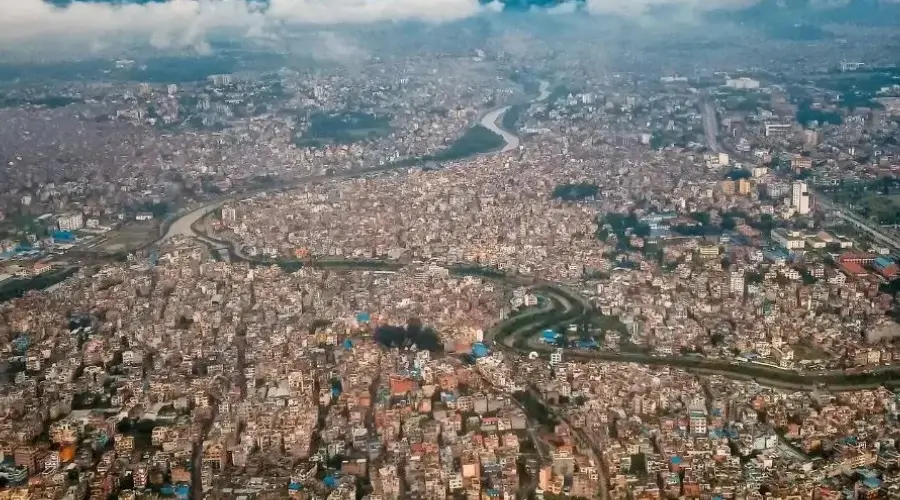
If your Annapurna Base Camp Trek Itinerary begins right after the next day, you may have to prepare for your trek, including checking your gear, meeting with company personnel and your guide, and rest enough to gain fortitude for the upcoming adventure.
Meal : Not included
Accommodation : Not included
Walking / Driving : Not Needed
Day 02: Flight/Drive to Pokhara from Kathmandu Airport/Bus Park
How you’d like to get to Pokhara from Kathmandu with two travel options?
Option 1: Airway (25 minutes flight)
If you have limited time and get bored during a long bus journey, this option is amazing.
NOTE: Taking a short flight, you can shorten your trip by one day.
Option 2: Roadway (6 to 7 hours drive)
This can be the best option if you have enough time and are fond of travelling in a luxurious tourist bus, capturing the greenery through the windowpane. You get the opportunity to begin your trek in the fresh morning.
The distance between Pokhara and Kathmandu is around 200 km, and you will travel via Prithvi Highway. The condition of the road is not too good, there are various potholes on the way and during the rainy season the road may be obstructed by the landslides.
About Pokhara in Short:
Pokhara is one of the world’s most beautiful and mysterious cities, about 200 Kilometres west of Kathmandu.
Pokhara is also the gateway for the Annapurna Conservation Area, which includes Dhaulagiri, Annapurna I, and Manaslu—the three highest peaks in the world.
Sports like trekking, rafting, bungee jumping, etc., are very popular in Pokhara. The mysterious caves, Davis Falls, and beautiful large lakes attract thousands of tourists worldwide every year, making this small valley an important tourist destination.
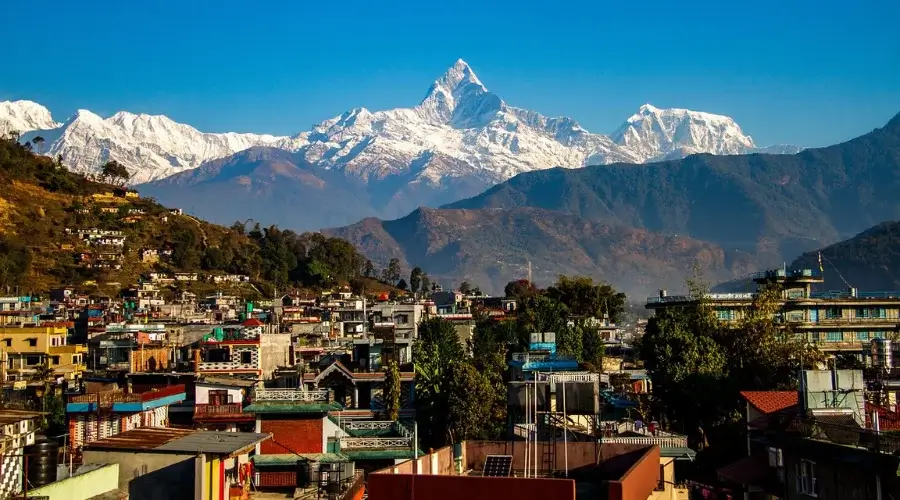
Meal : Breakfast, Lunch & Dinner
Accommodation : 3-Star Hotel
Walking / Driving : 25 minutes flight or 6 to 7 hours driving
Day 03: Drive from Pokhara to Nayapool & Trek to Ulleri
Trek Route: Pokhara → Nayapool → Birethathi → Hile → Tikhedhunga → Ulleri
- Beginning point: Pokhara (822 m)
- Ending Point: Ulleri (2070 m)
- Lunch: Tikhedhunga
- Distance: 12 km
- Total Descent: 125 m
- Total Ascent: 1248 m
- Overnight: Ulleri
Attractions:
- Beautiful scenery along the route.
- Stunning views of Annapurna South, Hiunchuli, and Fishtail.
- 3767 stone stairway steps.
Challenges:
- Long and steep ascend
- Dusty road
- Long and rough trail
- Steep ascents
Our Annapurna Base Camp Trek from Pokhara only begins with a short walk to Nayapool, where your ABC trek officially begins. Upon arriving at the bus stop of Nayapool, you need to commence your hike to Ulleri.
Get your permits and TIMS card checked at the Birethanti checkpoint and keep them safe throughout your trip.
You will have to get them checked in many other checkpoints. You will pass through beautiful villages with nice river views, farmland and green forests.
Birethanti, Chimrung, Syauli, Kimche, Chane, etc., are the best places to stop for rest, lunch, or snacks. The trail moves ahead through attractive villages, green hills, and rivers.
The Bhurungdi Khola (river) will touch you, flowing through cool mountain valleys and soothing farming villages. A portion of the trail on this day is adventurous.
Just after crossing the suspension bridge over the Tikhedhunga Khola (river), the trail heads up a steep stone stairway with exactly 3767 steps.
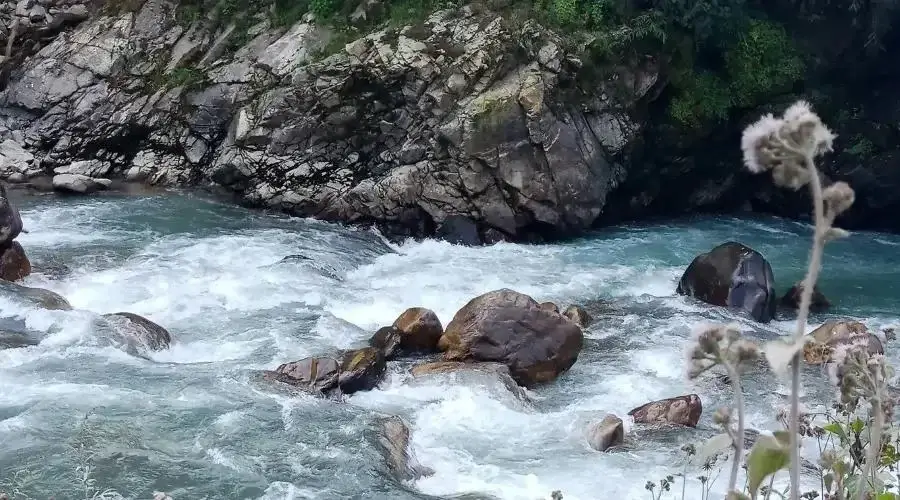
After completing those steps, you will reach the top of the hill from where the panoramic views of Mount Annapurna South (7219 m) and Hiunchuli (6441 m) make you forget your tiredness of climbing the steep ascent.
Besides stunning mountain views, the scenic area of blooming rhododendron forest is appealing on the rest of the trail.
About Tikhedhunga Village:
Tikhedhunga is a small village on the way to the ABC trek. There are around 10-15 teahouses in this area. You will need to cross a river to reach the village. During the ABC Trek, we will have our lunch at Tikhedhunga. It is a small coffee and lunch hub area. Most of the people in the region are Gurung and Magar.
About Ulleri Village:
Ulleri is a big village compared to Tikhedhunga. Most of the people who live there are Gurung, Magar, Chhetri, and Brahmin. There are more than 30 teahouses in Ulleri. The teahouses are good, and most of them are wooden or cemented.
The major sources of economic growth for the people of this region are agriculture and tourism. Regarding the local people, there are around 200 houses, and around 800 people reside in Ulleri.
Teahouses in Ulleri:
– More than 30 teahouses.
– Attached bathroom, hot shower, single bedroom, standard rooms.
– You do not have to pay for Wi-Fi, hot shower, or charging.
– You will spend the night in one of the best teahouses in Ulleri.
Meal : Breakfast, Lunch & Dinner
Accommodation : Tea House
Walking / Driving : 1 to 1.5 hours driving and 4 to 5 hours walking
Day 04: Trek to Ghorepani from Ulleri
Trek Route: Ulleri → Banthati → Nangethati → Lower Ghorepani → Upper Ghorepani
- Beginning Point: Ulleri (2000 m)
- Ending Point: Ghorepani (2874 m)
- Distance: 9 km
- Lunch: Nangethanti (2430m)
- Total Descent: 90 m
- Total Ascent: 874 m
- Overnight: Ghorepani
Attractions:
- Stunning view of blooming rhododendron.
- Several small waterfalls.
- Diverse landscape.
After breakfast at around 7 a.m., you will start your trek at 8. This is a special day for you as most of the trail goes through the jungle and beautiful waterfalls.
It is also a short hike day on which we recommend you do a relaxed trek, standing and staring at every wonderful station.
If you are lucky enough to catch your trip in the spring, you will be amazed at the breathtaking views of blooming rhododendrons along the trail. The diverse landscape, stunning views of snow-capped mountains, and sudden encounters with wild birds and animals will really turn your tiring trip into a pleasant one.
You will enjoy lunch at Nangethanti. However, some trekkers prefer to reach Ghorepani before having lunch and wish to spend the whole afternoon in the surroundings of Ghorepani.
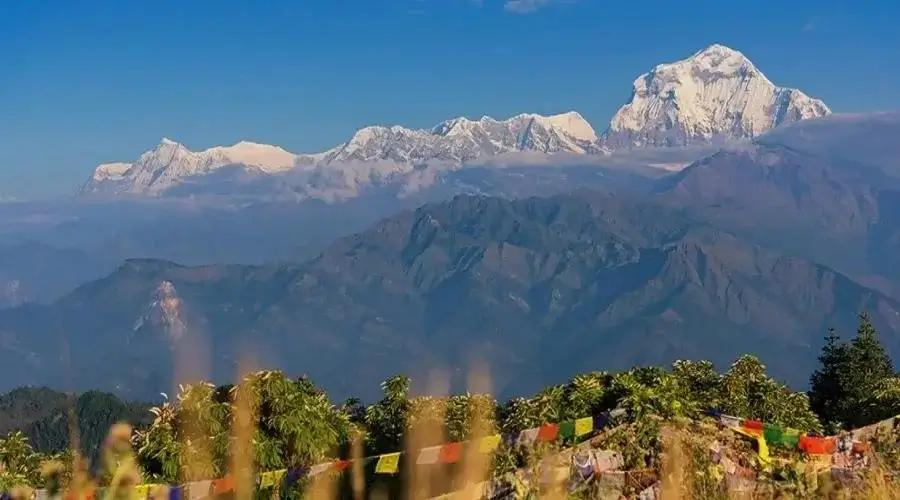
About Ghorepani Village:
There are two villages, the lower and the upper. Most check posts are there in the lower Ghorepani. The two villages are just within 10 minutes of walking distance. You might be finding Ghorepani blustery compared to Ulleri.
In Ghorepani village, you can find primary schools, health posts, and army checkposts, where your permits will be checked.
Teahouses in en route Ulleri
Banthati: 8-10 teahouse (Mostly lunch based)
Nangethati: 4-5 teahouse
Lower Ghorepani: 10-15 teahouse
Upper Ghorepani: 50 teahouses
About the facilities of teahouses:
– Can find Western foods.
– Attached bathroom, hot shower, single room(rare).
– Basic to luxurious teahouses.
– No cost for Wi-Fi, hot shower, and charging.
Meal : Breakfast, Lunch & Dinner
Accommodation : Tea House
Walking / Driving : 3 hours walking
Day 05: Trek to Tadapani from Ghorepani - Hike to Poon Hill
Trek Route: Ghorepani → Poon Hill → Ghorepani → Deurali → Banthati → Tadapani
- Beginning Point: Ghorepani (2874 m)
- Ending Point: Tadapani (2610 m)
- Maximum Altitude: Poon Hill (3210 m)
- Type of trail: Steep uphill/steep downhill
- Distance: 3 km
- Poon Hill Entry fee: NPR. 100/-
- Accent: 336 m
- Descent: 264 m
- Overnight: Tadapani
On this day, you will have two treks. The first is an early morning short trek for Poon Hill Peak and the other for Ghandruk. However, the short trek to Poon Hill is optional.
NOTE: Please ignore the ‘Trek to Poon Hill’ section if you do not choose it.
Attractions:
- Wonderful sunrise view from Poon Hill Peak.
- Stunning mountain views.
- It is an amazing hike through a beautiful forest.
Challenges:
- It would be best to wake up early to catch the sunrise view from the Poon Hill peak.
- Steep ascent and descent are probably slippery due to snowfall.
You will see one of the fantastic peaks of your trip today. The Poon Hill (3210 m) is an amusing peak that is viral for sunrise/sunset views and stunning Himalayan views. If the sky is clear, you can see thousands of twinkling stars, giving the impression of paradise. The trail is steep uphill. It takes around 45 minutes to reach the top. Poon hill Trek is the major highlight of the Annapurna Base Camp Trekking package.
If you are trekking in the peak season, don’t worry about getting lost; the trail is filled with hundreds of trekkers. The peak is icy, probably snowing. Wear enough clothes to keep you warm. Carrying water is just as you get thirsty while climbing up. A headlamp is essential as it might be dark on the trail while climbing up to the peak. A camera, gloves, beanie, hiking pole, and some money are enough to carry.
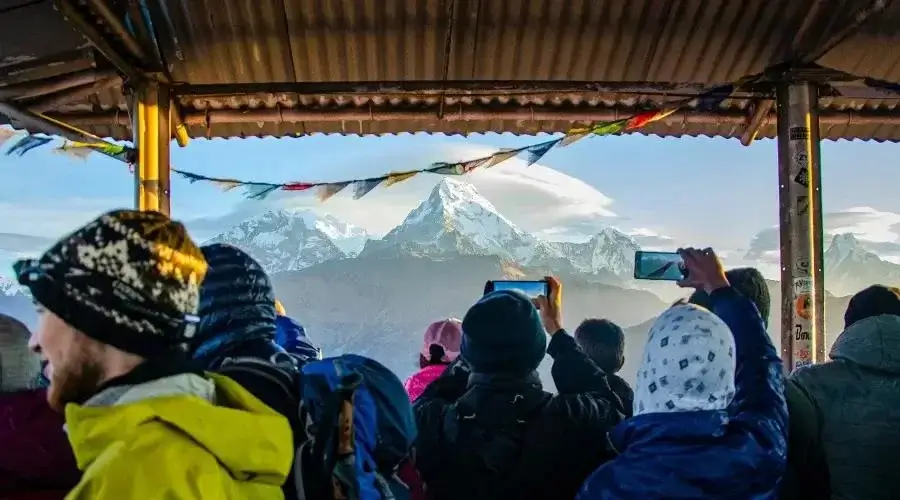
Basic Requirements:
Do not carry unnecessary things, as this makes the trek more exhausting. Safely lock your stuff in the teahouse room. You will spend around 30 minutes on top.
The descent might be faster than the accent, but the trail might be slippery because of the snow. Hiking poles are best.
Some visitors also trek to Poon Hill Peak in the afternoon. If the climate is clear, the views in the afternoon are more stunning. The trail is not so crowded in the afternoon, and there is probably no need to ask for an entrance fee.
After returning from Poon Hill Peak, enjoy your fantastic breakfast at the teahouse. Then, the trek to Tadapani begins, requiring nearly four hours of walking. The trail passes through patches of local villages, allowing you to stop for lunch, rest, or buy/refill your water bottle.
The majority of this trail is downhill, probably slippery with snow. Just before Tadapani, there is one significant 200 m steep uphill, which is also the last ascend of the day. Most trekkers stay overnight at Tadapani, where many teahouses offer good accommodation.
Teahouses en route Tadapani:
Deurali: 2-3 lunch Teahouses
Banthati: 4-5 teahouses
Tadapani: 12-13 teahouses
About the facilities of Tadapani route teahouses:
– The teahouses have basic facilities.
– You might be charged extra for services like Wi-Fi, hot shower, charging, and hot water.
– Most of them do not have an attached bathroom or single bedroom but are neat and clean.
Meal : Breakfast, Lunch & Dinner
Accommodation : Tea House
Walking / Driving : 6 to 7 hours walking
Day 06: Trek to Sinuwa from Tadapani
Trek Route: Tadapani → Chule → Kirung Kholac → Gurjung → Durbin Danda → Chhomrong → Sinuwa
- Beginning Point: Tadapani (2610 m)
- Ending Point: Sinuwa (2360 m)
- Distance: About 12 km
- Descent: 250 m
- Overnight: Sinuwa
After a fantastic breakfast, enjoy the beautiful views of Fishtail Peak from your teahouse table and begin your trek to Sinuwa. There are two ways to go from Tadapani: one is to Ghandruk, whereas the other is to Chomrong. You must follow the Chomrong trail and descend through the beautiful forest and terraced farmland.
After crossing the bridge over the Kimrong River, you will be amazed to see the stunning view of Upper Modi Valley.
Begin hiking to Taulung after you cross the bridge. A steep uphill makes you tired before reaching a beautiful Gurung village, Chomrong. A long descent of stone steps takes you to the bridge over the Chomrong River.
Cross the river and begin ascending to Sinuwa, where you can spend the night in one of the beautiful teahouses.
About Chhomrong Village:
Chhomrong is a large and most beautiful villages en route to the Annapurna Base Camp. Most of the people in this region are Buddhist. Many people are engaged in tourism and agriculture. You can see the beautiful view of Annapurna range from Chhomrong. You will see mules around the village.
You can also see a beautiful monastery in Chhomrong. There are about 70-80 houses in Chhomrong of local people.
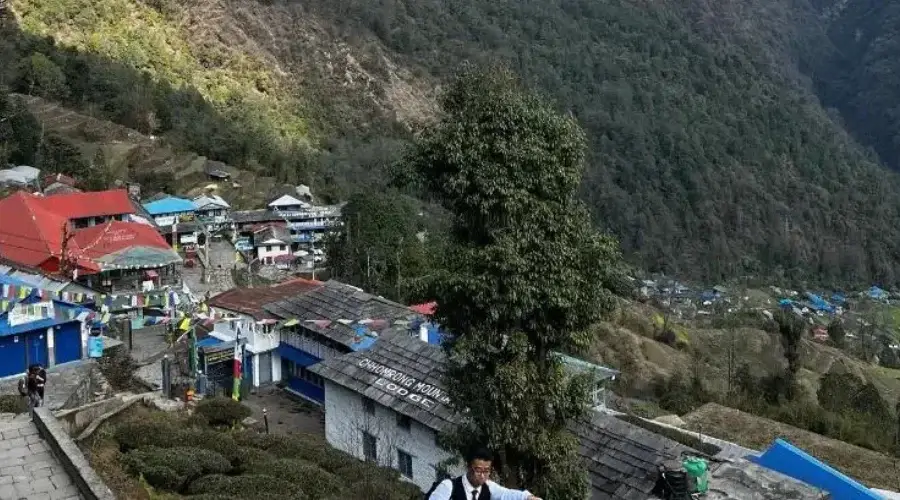
About Sinuwa:
Sinuwa is most likely a trade hub area for teahouses. You can only find a few local houses in Sinuwa. Most of the people are engaged in running teahouses. You can find a shop that sells the essential gear for the trek in Sinuwa.
Teahouses in Sinuwa:
– Around 7-8 teahouse
– Food costs around Rs.500- 700 (Nepali Khana Set).
– Basic teahouses with basic facilities.
– You do not need to pay extra for Wi-Fi, charging, and hot shower costs.
Meal : Breakfast, Lunch & Dinner
Accommodation : Tea House
Walking / Driving : 6 to 7 hours walking
Day 07: Trek to Deurali from Sinuwa
Trek Route: Sinuwa → Bamboo → Dovan → Himalaya → Deurali
- Beginning Point: Sinuwa (2360 m)
- Ending Point: Deurali (3200 m)
- Distance: About 11 km
- Accent: 840 m
- Overnight: Deurali
Today, you have a comparatively easy ascent that moves ahead through the rhododendron, bamboo, and oak forest. You will pass Kuldhigar and then to Bamboo, where you will see the large bamboo forest and other flowers and ferns. The bamboo route to Dovan is easy because there are no steep ascents or descents.
The trail heads towards Dovan. After passing Dovan, you reach the Hinku cave in the dense forest.
Depending on your hike’s pace, you will have your lunch at Dovan or Himalaya. The trail thereafter is probably covered with snow. A few meters ahead of the Hinku cave, there is a high avalanche risk area, and even ACAP has listed a board there mentioning the avalanche risk area.
Then, after crossing it and walking for more than 20 minutes, you will reach Deurali.
Finally, you reach Deurali, a pleasing village where you can stay overnight.
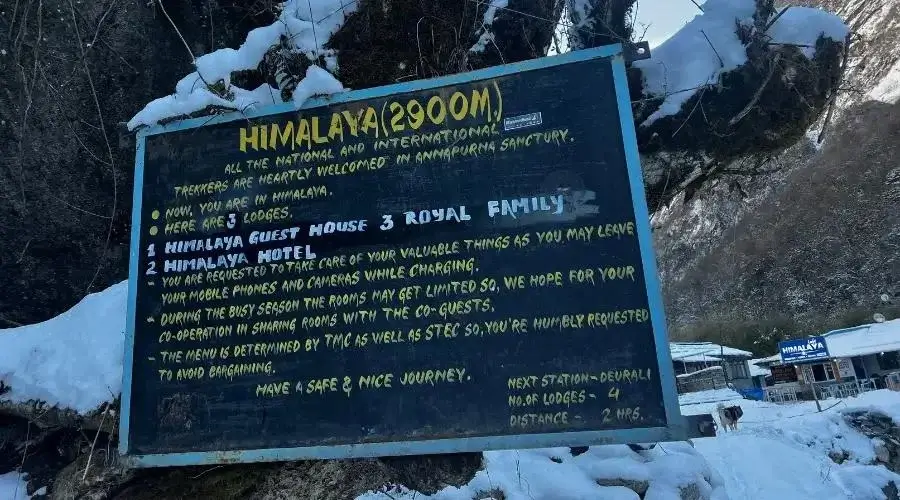
About Deurali:
Deurali is also a teahouse area comprising around five teahouses. The avalanche area and Mardi Himal Base Camp are clearly visible. The temperature of Deurali is chilly during the winter and off-season.
About the teahouses in Deurali:
– There are around five teahouses in Deurali.
– You will find basic services only.
– You have to extra charge for Wi-Fi, hot shower and charging, and even hot water.
– No attached toilet bathroom and a single bedroom.
Meal : Breakfast, Lunch & Dinner
Accommodation : Tea House
Walking / Driving : 6 hours walking
Day 08: Trek to Annapurna Base Camp/ABC from Deurali
Trek Route: Deurali → Machhapuchhre Base Camp → ABC
- Beginning Point: Deurali (2900 m)
- Ending Point: Annapurna Base Camp/ABC (4130 m)
- Distance: About 8 km
- Accent: 1230 m
- Overnight: Annapurna Base Camp
Today is the special day of your trek. You will spend the night at Annapurna base camp, which is also the central point of the trip, at an elevation of 4130 meters.
There are two different ways to reach ABC. Depending on the season of your visit, you need to choose the best one.
If you are trekking through Himalayan Masters, our guide will decide the best way for you. These areas are quite dangerous as there is a high possibility of avalanches. Along the way, there are no water sources except the river. So, make sure to carry enough water to keep yourself hydrated.
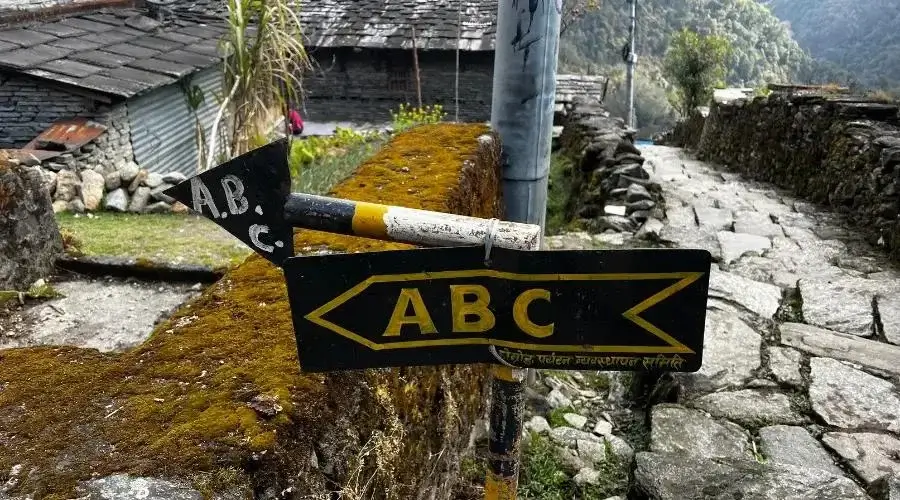
After walking for around 3 hours, you will finally reach the final destination, ABC. The breathtaking views of Annapurna I, Annapurna South, Machhapuchre, Hiunchuli, and many other snowcapped mountains will give you the impression of heaven. Those views are more stunning in the morning.
Teahouses in Machhapuchhre Base Camp:
– Around 4-5 teahouses.
– Very basic services.
– Wi-Fi and hot showers are available, but you must pay extra.
– Heating services are available but only in the dining room.
Teahouses in Annapurna Base Camp:
– Around five teahouses.
– Not so fancy and luxurious as it is located at a high altitude.
– A bucket hot water shower is available, but you must pay extra.
– Food and other services are very costly compared to other days.
Meal : Breakfast, Lunch & Dinner
Accommodation : Tea House
Walking / Driving : 6 to 7 hours walking
Day 09: Trek to Bamboo from ABC
Trek Route: ABC → MBC → Deurali → Himalaya → Dovan → Bamboo
- Beginning Point: Annapurna Base Camp/ABC (4130 m)
- Ending Point: Bamboo (2310 m)
- Distance: About 19 km
- Descent: 1820 m
- Overnight: Bamboo
Attractions:
- Alluring mountain views from ABC
- The stunning landscape and rhododendron forest on the way
- Fascinating views from Sinuwa
- Charming villages along the trail
Challenges:
- The steep and long descent
- Slippery trail due to snowfall
- Extreme cold
After you cherish the morning panoramic views from Annapurna base camp, you must descend to Machhapuchhre base camp, Dovan, and then to Sinuwa. The trail moves forward through rhododendron forest, and finally, you reach Sinuwa, from where you will be almost intoxicated by the magnificent mountain views.
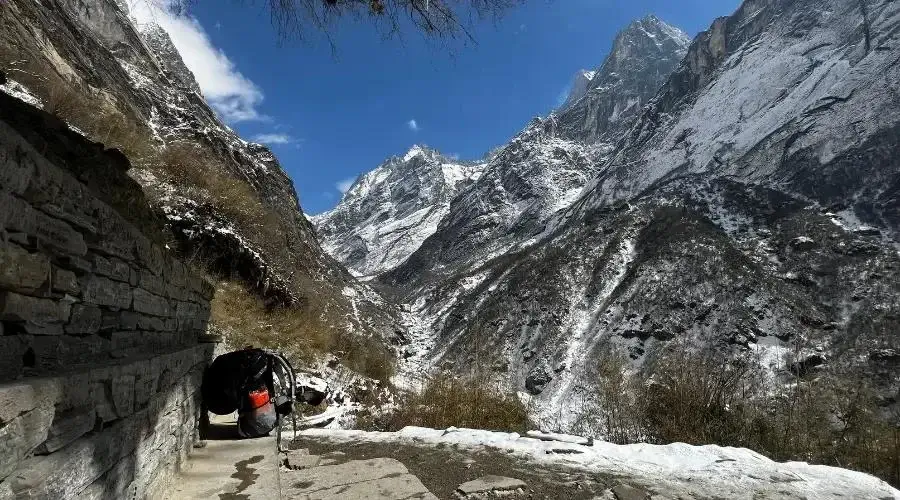
About Bamboo:
You might have guessed why it is called bamboo. It is because the place has huge bamboo trees everywhere. Bamboo is at a low altitude, so you may not be able to see any scenic highlights from it.
Teahouses in bamboo:
– Around six teahouses.
– Basic facilities.
– No attached bathroom or single bedroom.
– We must pay extra for the Wi-Fi, hot shower, and charging.
– The charging facility can be only found in the dining room.
Meal : Breakfast, Lunch & Dinner
Accommodation : Tea House
Walking / Driving : 6 hours walking
Day 10: Trek to Jhinu Danda from Bamboo)
Trek Route: Bamboo → Upper Sinuwa → Lower Sinuwa → Chhomrong → Jhinu Danda
- Beginning Point: Bamboo (2310 m)
- Ending Point: Jhinu Danda (1780 m)
- Distance: About 17 km
- Descent: 530 m
- Overnight: Jhinu Danda
Attractions:
- Natural hot shower (probably the next morning)
- Mostly downhill trail
- Diverse landscape
Challenges:
- Long and tiring descent
When you return from the Annapurna Base Camp to Pokhara, our guide will lead you to the shortcut route so that you can travel a longer distance than you normally expect. Since most of the trail are to be descended, it is easier than ascent.
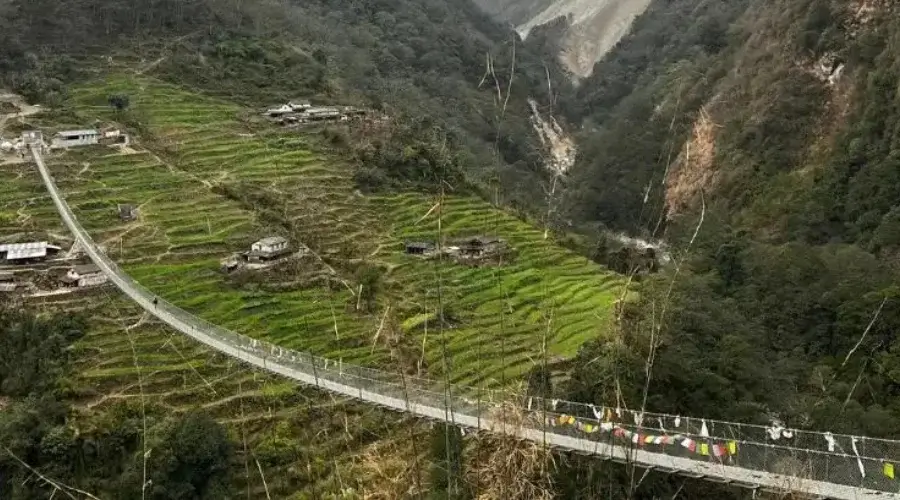
After the 5 to 7 hours walk, you will reach Jhinu Danda to spend a night in one of the best teahouses. The next day, you will get the amazing experience of taking a natural hot water shower. You will be perplexed seeing the hot water running in the natural spring.
Teahouse in Jhinu Danda:
– Around six teahouses.
– From basic to standard hotels.
– Have attached bathroom and single room.
– Free cost for charging and hot shower and charging.
Meal : Breakfast, Lunch & Dinner
Accommodation : Tea House
Walking / Driving : 4 to 5 hours walking
Day 11: Drive to Pokhara from Jhinu Danda
It is a special day to have a hot spring shower!
Our trekking ends at Jhinu Danda. Today, we will be driving to Pokhara.
Jhinu Danda is a small village where you can rest and share your trekking experiences. You can also visit a hot spring at Jhinu Danda, about 20 minutes down towards Jhinu Khola from your teahouse. Remember to bathe there and wash away all your tiredness.
Now, it is time to be satisfied with the completion of the successful trek over the Annapurna region. Have a relaxed breakfast and spend some hours in Jhinu Danda, which has the perfect views and sightseeing.
Our guide will manage a private car or a jeep to return back to Pokhara where you can spend the rest of the day exploring as many magical spots as you can.
Meal : Breakfast, Lunch & Dinner
Accommodation : Hotel
Walking / Driving : 2 to 2.5 hours driving
include / exclude
Trip Cost Includes
- Airport pick-up and drop-off service by private car
- 11 nights. The best available clean and comfortable Tea house accommodation during the trek
- All meals (breakfast, lunch and dinner) for ten days of trekking
- Three hot drinks a day (Tea and Coffee)
- Kathmandu to Pokhara on a bus and other traveling on a public sharing jeep
- Guide for ten days
- Trekking permits: Annapurna conservation permit and TIMS Card
- All Local and Government taxes and administrative charges
Complimentary services from Himalayan Masters
- Himalayan Masters Brand 25-degree sleeping bag during the trip
- Himalayan Masters Brand -25 Down jacket during the trek
- A pulse oximeter for monitoring your oxygen saturation and heart rate at high altitudes.
- Himalayan Masters brand water bottles and purification tablets
- First aid kit box
- Seasonal fruits for dessert
- Himalayan Masters Brand Duffle Bag for the Trek (If you hire a porter)
- Himalayan Masters Brand Trekking T-Shirt and Cap
- The guide keeps a bottle of oxygen on hand in an emergency.
- Annapurna trekking maps
Trip Cost Excludes
- Accommodation in Kathmandu in case of early arrival or late departure
- Lunch and dinner in Kathmandu
- Nepal Visa fee
- Travel and medical insurance
- International flights
- Personal expenses (phone calls, internet, laundry, bar bills, snacks, bottled or boiled water, souvenirs, hot showers)
- Personal trekking gear and equipment
- Porter for the trek (One porter for 13 days, USD 220)
- Private Transport
- Tips for guide and drivers (tipping is expected)
useful info
Annapurna Base Camp Trek Altitude
- Pokhara: 822 meters/2696 feet
- Nayapool: 1,070 meters/3510 feet
- Ulleri: 2,070 meters/6791 feet
- Ghorepani: 2,874 meters/9429 feet
- Chhomrong: 2140 meters/7020 feet
- Sinuwa: 2,360 meters/7742 feet
- Bamboo: 2310 meters/7578 feet
- Himalaya: 2,920 meters/9580 feet
- Deurali: 3,200 meters/10498 feet
- Machhapuchhre Base Camp (MBC): 3700 meters/12139 feet
- Annapurna Base Camp (ABC): 4,130 meters/13550 feet
- Jhinu Danda: 1780 meters/5840 feet
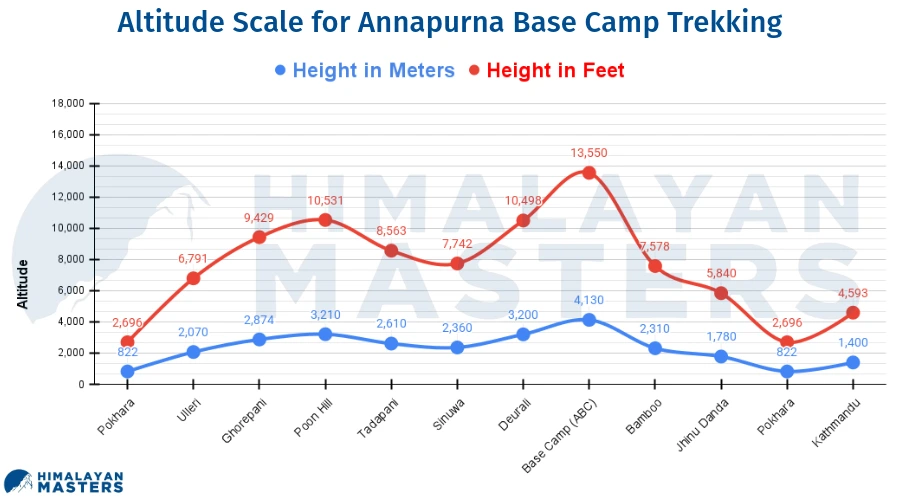
ABC Weather Information
Weather conditions at Annapurna Base Camp can be unpredictable. Be prepared for anything since weather forecasts might only sometimes be correct.
Pleasant, mild weather is typical in springtime (March to May). During the day, temperatures typically vary between 15°C to 20°C, while at night, they fall to about 5-10°C.
Autumn (September to November) is another suitable season for trekking. It has clear skies and temperatures equal to those of spring, with daytime temperatures between 15-20°C and night temperatures around 5-10°C.
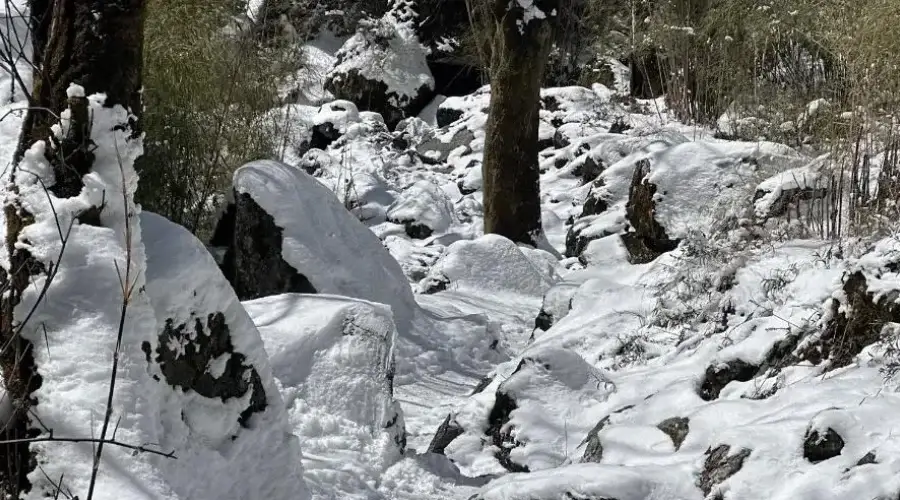
Heavy rains during the monsoon (June-August) make trails muddy and slippery. It is a changeable period, with frequent showers making trekking difficult.
The base camp temperature range during winter (January and February) is typically -15 to -17°C overnight, with daytime highs around 5-10°C. The higher you go, the colder it gets, coupled with their unpredictable nature.
Best Time to do Annapurna Base Camp Trek
The best times to trek to Annapurna base camp are spring and autumn. Mid-March through May, spring is characterized by good weather and blooming rhododendrons.
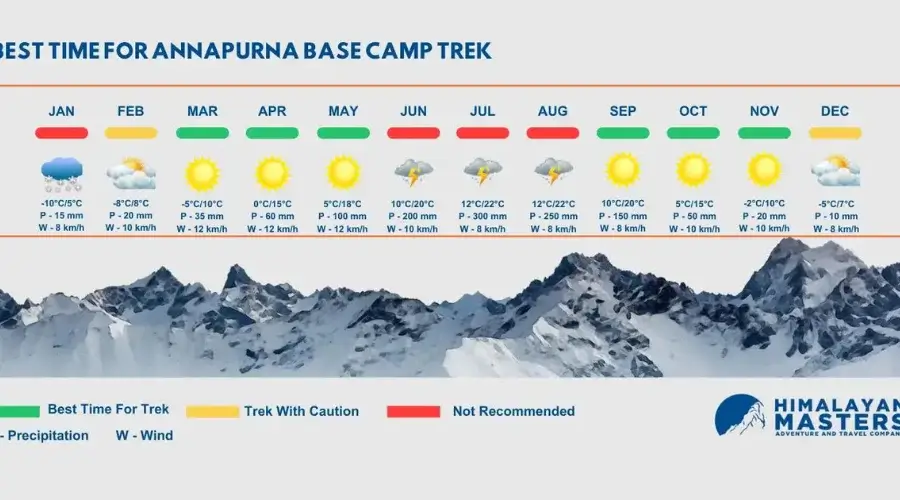
Autumn has dry weather and clear skies from September to November. It has always been a perfect season for trekking, as it brings pleasant conditions and impressive views of mountains like Machhapuchhre.
However, it’s important to note that the period from June to August (monsoon season) and December to February (winter) aren’t suitable for a visit. The trails become muddy during the monsoon season, making them difficult to navigate due to slippery surfaces.
During winter, it will be cold with snow, making it challenging to trek because of the risks of avalanches. For optimal experience, plan your trip in spring or fall.
Difficulty of Annapurna Base Camp Trek
Many people ask how difficult the Annapurna base camp trek is. The challenging difficulty level of the Annapurna Base Camp trek is moderate. It is not difficult, but not easy. People with firm determination and willpower will make it to the base camp. You must walk 5- 6 hours daily and be physically fit. The trail has a gradual ascent and descent, so your legs must be good and fit for it.
If there are steep stairs somewhere, you must be prepared for them. The difficulty level certainly increases in the winter season. Since it snows in the winter, the paths become slippery, and due to the high altitude, it won’t be easy to walk and breathe. It would be best if you had a crampon for the winter season.
Roads on the ABC Trek & How to Avoid
To avoid roads on the circuit to Annapurna Base Camp, consider taking less-travelled trails and paths that are more scenic and less frequented by vehicles. Opt for the Annapurna base camp route, which is more remote and away from the main roads, where you can enjoy the natural beauty and calmness of the Annapurna base camp route.
It’s also advisable to plan your trek during the off-peak season when fewer tourists and vehicles are on the roads. This way, you can enjoy a more peaceful and authentic trekking experience in the stunning Annapurna region.
Trip Grade: Fitness level, Medical, & Health
Fitness Level
To trek to Annapurna Base Camp, one must be fit enough. There will be long ascents and descents, so strong abdominal muscles are important. Though previous experience is optional, those who are physically ready would do better here. The hike is simple enough that even novices can handle it, although you must still be prepared.
Medical
Avoid the trek if you are diabetic or pregnant because these two conditions may worsen. Moreover, you should consult your medical doctor before beginning the trek to determine whether your health condition can allow you to do it.
Health
Make sure that nutrition is good. Eat balanced foods with carbohydrates, proteins, and healthy fats, which provide energy, to help your body recover from this and cope with its requirements appropriately. Get enough rest and sleep for quick recovery and handling the trip’s demands.
Special Training For ABC Trek
No special training is mandatory for the Annapurna base camp hike, but it is advisable to mentally and physically prepare yourself. Resistance and power can also be gained by doing activities such as walking, hiking, or jogging as much as possible.
You can also benefit by taking advantage of the exercise to carry the backpack and thus get used to the weight. Legs, core, and upper body can be strengthened by squats, lunges, planks, and push-ups, which also benefit the human body.
Altitude Sickness During ABC Trek
During the Annapurna Base Camp Trek, there is a high chance of altitude sickness. There is no such risk up to Chhomrong and Bamboo, but from Dovan to Deurali, one can be prone to it. The risk increases as the height increases.
The trekkers must carry Diamox or Zolamide to avoid altitude sickness during the trek. Also, after taking these medicines, one must drink enough water—at least 2-3 litres—during the ABC Trek.
Emergency and Evacuation at ABC Trek
Trekking to Annapurna Base Camp requires being prepared in an emergency and knowing how to deal with evacuations. Having a first-aid kit and learning how to use it is also essential. Himalayan Masters is available to evacuate to lower elevations or a medical facility in the case of a serious emergency, such as a head injury or severe altitude sickness.
Travel insurance that includes emergency evacuation is a must; insurance will pay for the costs of a helicopter evacuation if it has to be used.
Insurance for ABC Trek
Travel insurance is necessary for the Annapurna Base Camp trek to protect against unexpected events. This insurance can cover medical emergencies, trip cancellations or interruptions, and even emergency evacuations. It’s essential to read the policy to understand what is carefully and isn’t covered.
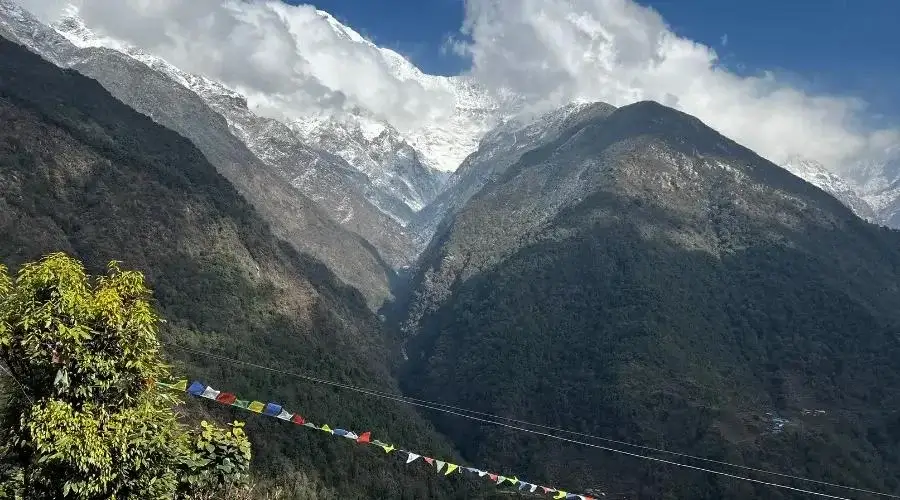
Ensure the insurance covers high-altitude trekking and has provisions for helicopter rescues if necessary, as these can be crucial in remote areas like the Annapurna region. Many insurance providers offer specialized trekking insurance for such adventures, so compare different policies to find one that best suits your needs.
ABC Trekking Experience
Adventure lovers from all over the world love an exciting trek to Annapurna Base Camp. As you walk through the lush forests and terraced lands, admire the stunning snowy mountain peaks. The ABC trekking is not easy, but it is reachable for most people with moderate fitness levels.
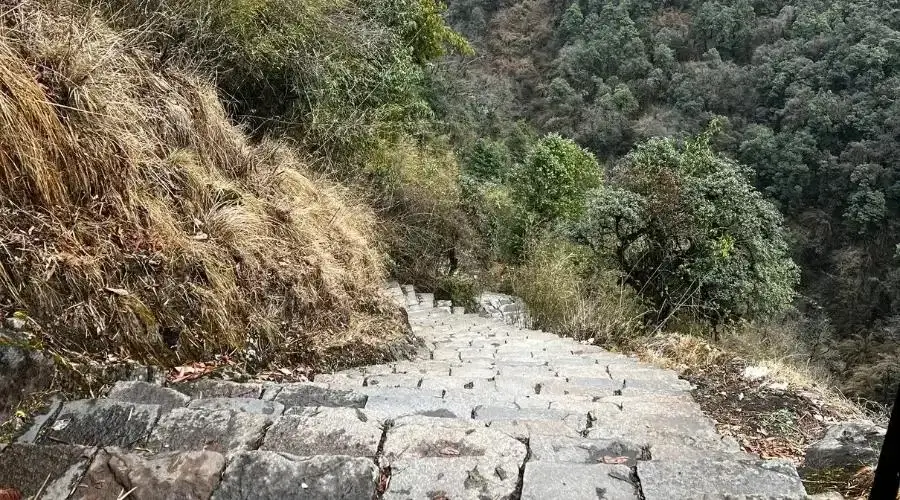
Local teahouses provide food and shelter, and local community members contribute to making the experience more enjoyable. The best time to go is spring and autumn for the clear skies. For those who want to experience the Himalayas, it is an adventure of a lifetime.
Annapurna Base Camp Trek Cost
The cost of the Annapurna base camp trek can vary depending on several factors. It can cost between $800 and $1500 per person for a 7—to 14-day trek. This cost typically includes accommodation, meals, permits, and a guide/porter. However, budgeting for additional expenses such as travel insurance, trekking gear, tips, and any extra activities is essential.
The cost of the Annapurna Base Camp trek can also vary by season, with peak seasons like spring and autumn being more expensive than the monsoon season. To ensure safety and support during the trek, it’s advisable to book through a reputable trekking agency. Himalayan Masters has a 100% success rate in the Annapurna Base Camp trek.
Additional Expenses for ABC Trek
When planning the Annapurna Base Camp trek, it’s essential to consider additional expenses beyond the basic costs. The cost can include permits, accommodation, meals, and equipment. The Annapurna Conservation Area Permit (ACAP) and Trekkers’ Information Management System (TIMS) cards are mandatory and cost around $40-50.
Accommodation along the trek can vary from $5 to $20 per night, depending on the quality and location. Meals can vary from $5 to $15 per meal, with prices increasing at higher altitudes.
Budgeting around $15-20 per day for these additional Annapurna base camp trek costs is advisable, but carrying extra for emergencies or unexpected expenses is wise. The other extra costs are gear, tips, and extra food you want.
ATM on the ABC Trek Route
If you are trekking to the Annapurna Base Camp Trek, you must know that ATMs are available only in Pokhara and Kathmandu. No ATMs are on the trek route, so you must bring Nepali currency. Some teahouses might accept mobile banking for Nepali trekkers.
Money Exchange
Nepalese currency is used all over Nepal. Payments can be made in cash, by ATM, or through online payment services like mobile banking in major cities in Nepal.
However, payment by Visa or Mastercard will cost an additional 3.5% charge. So, you are advised to exchange your currency for Nepali currency at one of the money changer booths in Kathmandu or Pokhara.
Permits for Annapurna Base Camp Trek
You will need two permits for the Annapurna Base Camp Trek. Firstly, you need TIMS (Trekkers Information Management System). Then, it would help if you had an ACAP (Annapurna Conservation Area Permit). Himalayan Masters will cover and obtain the permits for you. TIMS will cost around $20, and ACAP will cost around $30 per person.
Kit and Equipment for ABC Trekking
Here’s a basic list of kit and equipment for the Annapurna Base Camp trek, categorized for hands, body, gear, foot, and other essentials:
If you want more information on the gear list, check out our blog: What to Pack For Annapurna Base Camp Trek.
Hands:
- Lightweight gloves
- Warm, waterproof gloves or mittens for higher altitudes
Body:
- Thermal base layer
- Insulating mid-layer
- Down fleece jacket
- Waterproof and windproof outer layer
- Trekking pants (convertible pants are versatile)
- Innerwear
- Quick-drying t-shirts
- Sun hat or cap
- Sunglasses with UV protection
- Scarf for neck protection
Gears:
- Backpack (40-50 liters)
- Sleeping bag (4-season rated for colder temperatures)
- Headlamp or flashlight with extra batteries
- Water bottles or hydration system (2 litres capacity)
- Personal first aid kit with basic medications
- Crampons (for winter)
Foot:
- Sturdy, broken-in hiking boots with ankle support
- Hiking socks (synthetic or wool)
- Gaiters (optional but helpful for keeping fragments out of boots)
Other:
- Sunscreen (high SPF)
- Lip balm with SPF
- Insect repellent
- Toilet paper and hand sanitizer
- Snacks and energy bars
- Cash for purchasing items along the way
- Personal toiletries and medications
- Lightweight towel or washcloth
- Camera or smartphone for capturing memories
- Trekking permit and necessary documentation
Accommodation and Food During ABC Trek
On the Annapurna base camp trek, there is nothing to worry about accommodation and food. You will have the best place to stay and the best food. There are no five-star hotels like that on the route, but you will be staying at teahouses. The teahouses have basic packages that include your food and bed.
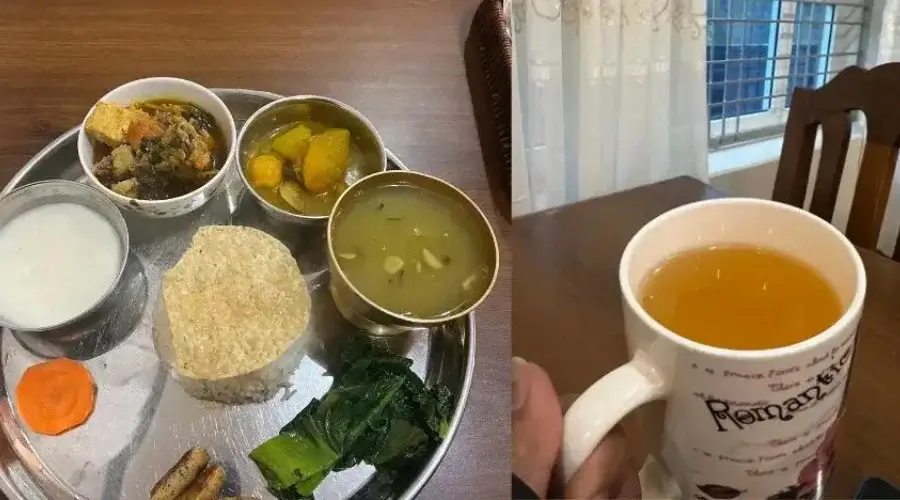
Teahouses on ABC Trek
A teahouse is a small local house that provides food and accommodation for visitors. During the ABC trek, the teahouse provides a warm bed and blanket and delicious breakfast and dinner.
The blankets provided by the teahouses might not be warm enough, so it is better to carry your own sleeping bag. Himalayan Masters will also provide a complimentary sleeping bag to ensure a good night’s sleep.
The rooms in teahouses are generally shared among 2 to 3 people, with or without an attached bathroom. Teahouses during the trek provide neat and clean rooms with additional services like hot showers, Wi-Fi, electricity, hot water, etc. (sometimes it costs an additional $1 to $5 charge).
Getting a private room might be difficult during the peak trekking season, while during the off-season, teahouses en route ABC are not so overwhelmed. If you want a room for yourself, you can contact us for advance booking.
Some teahouses have stoves for warming the dining room. Some might even have a food menu offering a variety of options.
The water in the teahouses during the ABC trek is usually spring water. You might want to sterilize it by boiling it or using a water purification tablet. You can also buy bottled water.
Foods on ABC Trek
The trekking route to the base camp of Mount Annapurna is popular and well-established. So, teahouses on the trek provide a wide range of food options.
Although there are no star restaurants, the food provided by the teahouses is clean, delicious, and healthy. You can also find traditional local cuisines on the route.
Breakfast, lunch, and dinner are all included in the trip package.
Breakfast at the teahouse on the Annapurna trek
- Gurung bread with jam or honey
- Tea and hot water
- Seasonal fruits (if available)
- Omelette with onion, tomato, and chilly
- Sometimes, a hot porridge with milk
Lunch at the teahouse on the Annapurna trek
- Dal Bhat and veg and non-veg curry
- Tea made of yak milk
- Noodles
- Soup
Dinner at the teahouse on the Annapurna trek
- Verities of soup (garlic soup, veg and non-veg soup)
- Dal Bhat and veg and non-veg curry
- Fry rice
- Momo
- Rice pudding (if available)
- Spaghetti
- Tibetan bread
Electricity & Battery Recharge on ABC Trek
Planning for electricity, battery recharge, and access to water is essential during your trek. While Annapurna base camp hike in Nepal, especially in remote areas, electricity availability can be limited.
Carrying portable chargers or power banks is advisable to keep electronic devices powered up. Additionally, many tea houses along the trekking routes offer charging facilities for a fee.
Moreover, it’s worth noting that accommodations, such as guesthouses or tea houses, may have limited charging options. For example, in Sinuwa, you won’t find plugs and chargers in your room. Instead, these facilities are usually available in common areas, such as the kitchen, and are shared among all trekkers.
Therefore, it’s wise to plan your device charging accordingly, considering the availability of charging points and the needs of other trekkers.
Water During ABC Trek
Staying hydrated throughout your trek is essential. Carrying a reusable water bottle and purifying tablets or a filtration system can help ensure access to safe drinking water. Himalayan Masters will provide complimentary water purification tablets.
Communication on the ABC Trail
Usually, the teahouses on the ABC trail have Wi-Fi and cellular access. However, they might be very slow due to bad weather or connecting several devices to the Wi-Fi.
So, we suggest you buy an NTC or NCELL SIM, activate data packages, and surf faster internet. You can buy it at the airport or any shop that sells SIM cards.
Safety and Security in ABC Trek
Nepal is a safe travel destination. However, it is always wise to check the latest update if there is anything going on. Theft is rare during the trek, though it happens. You can leave your valuable belongings that are not required on the ABC trek in our office or at your hotel in Kathmandu.
Once you are on a trekking journey, follow the instructions from your guide in case of any emergencies. It is seldom but avalanches, flood, landslides, earthquake, etc. can occur anytime.
Likewise, altitude sickness is common at higher-altitude treks such as the ABC trek. In such a case, inform your guide and follow the safety measures.
Porters Versus No Porter on the ABC Trek
ABC Trek might not be a long trek like Three Passes Trek or ABC with Circuit Trek, but trekking for 8 days with your own pack might be strenuous. In such a case, hiring a porter could be a wise decision.
Hiring a porter is not included in the trek price, but it can help you avoid carrying a heavy load and enjoy the scenery more. Also, if you have a load under 10 kg, you can even share the porter with fellow trekkers on the same route.
Remember, you’ll still need to carry a day pack weighing around 3 to 4 kg.
Tips on Hiring a Porter for ABC Trek
- Each porter can carry a maximum of 20 kg per client. But, the less the load, the better it is. We will provide a duffle bag that is specially made for the porters to carry.
- You can share a porter with fellow trekkers if you have less weight, under 10 kg.
- As the porters will walk faster than you and meet at the overnight spot, so you need to carry a day pack.
- When you hire him as a porter, you are directly benefiting his family and the rest of his society.
Tipping the Guide and Porter after completing ABC Trek
Your guide and porter have done their best to ensure that you enjoy the trip and have minimal stress. I encourage you to tip them as a sign of appreciation for the job well done. Most importantly, all of the tips you give go directly to them. There is nothing we remove from our guides or porters.
The rate is to pay a 10% commission on your trip as a guide. Porters are paid on a daily basis. As I pointed out earlier, within the context of sharing a porter, the tip can equally be split. It’s good to give more at times, of course!
Alternative Trekking Routes for ABC Trek
Yes, there are many alternative routes for the Annapurna Base Camp trek. You can choose a suitable route according to the days you want to trek and your budget. The most famous routes are:
Route 1: Kathmandu- Pokhara- Nayapul- Jhinu Danda- Chhomrong- Sinuwa- Bamboo- Dovan – Deurali- MBC- ABC
You can return from the same Annapurna base camp route.
Route 2: Kathmandu- Pokhara- Ghandruk – Chhomrong- Sinuwa- Bamboo- Dovan- Deurali – MBC- ABC
This route takes you through Ghandruk village, which is very popular for its Gurung Village. It is one of the most beautiful and biggest Gurung villages.
You can also choose the Annapurna Base Camp Helicopter Tour with Himalayan Masters. This tour suits those who want to travel to the base camp quickly or may have physical problems trekking.
Annapurna Base Camp Yoga Trek
The Annapurna Base Camp Yoga Trek is a unique trekking experience amid a beautiful view of forests, fields, pastures, mountains, and a small village.
During the yoga trek, you will start your day with a short yoga session to stretch and relax your body. Then, in the evening, we will find a serene spot for you to relieve your stress and tiredness with yoga.
ABC yoga trek lets your body rest and feel refreshed with a peaceful environment and excellent views.
Extending Staycation in Nepal
Extending Your ABC Trek
Your ABC trek can be extended by one or two days. Instead of returning to Pokhara from Jhinu Danda by vehicle, you can trek up to Phedi. The route passes through the beautiful villages of Landruk, Tolka, Kande, and Dhampus.
Extending your stay in other parts of Nepal
Nepal is a beautiful country with diverse geography, ecosystem, culture, and people. There are several famous places in Kathmandu, Pokhara and several other places in Nepal.
If you are short on time, we recommend that you can visit around Kathmandu, Pokhara or the Chitwan National Park before or after the trek.
If you have enough days to spend more time in Nepal, then you can visit other destinations like Palpa and visit Rani Mahal. Likewise, you can also go to Rara Lake, Gosaikunda Lake, or Tilicho Lake to witness the excellent view and lake. Similarly, Gorkha, Lumbini, and Janakpur are some of the historical and cultural destinations that you can visit.
Bardiya National Park is another popular tour destination for witnessing rich flora and fauna. The National Park is home to rare species of tiger, over 600 species of animals, around 400 species of resident and migratory birds, over 100 species of fish, and around 850 species of plants.
We can organize a Nepal tour along with a professional licensed tour guide if you would like to extend your vacation in Nepal.
Side Trip with Annapurna Circuit and Base Camp Trek
The Annapurna Circuit Trek with Annapurna Base Camp Trek is a long journey in the Himalayas of Nepal. This trek can take up to 23-25 days. If you have enough time and want to go on an exciting and challenging trek, then this might be the best option for you.
Annapurna Circuit Trek with Base Camp Trek offers almost everything that the Annapurna region has to offer. You can reach the base camp of the world’s 10th-highest mountain, Annapurna I. You can enjoy the traditional villages and alluring mountain view and their surroundings.
Although the journey might be long and exhausting, it is going to be an experience of a lifetime.
Annapurna Base Camp Trek with Mardi Himal Trek
The Annapurna Base Camp Trek with Mardi Himal Trek is going to be 14-16 days itinerary. On this trek, you can visit almost all the highlight villages and viewpoints in the vicinity of Annapurna Mountain.
You can visit Ghorepani Poon Hill for witnessing the mesmerizing sunrise view rising from the Annapurna (8,091 m/26,545 ft) and Dhaulagiri (8,167 m/26,795 ft). Also, you can visit and stay in one of the best Gurung Villages, Ghandruk, where you can enjoy their warm hospitality, tradition, and food.
Then there is the Mardi Himal Trek, which takes you to the base of Mardi Himal (5553 m/18,218.5 ft). You can see an up-close view of Fishtail and Mardi Himal. A view of rhododendron and oak forest during blooming season is a serene experience.
How to Book Annapurna Base Camp Trip
Himalayan Masters is a Nepal government-registered adventure and travel company. We are dedicated to helping you reach your destination with utmost safety and comfort. Our professional guides, porters, and entire team are here to support you on your journey in the Himalayas.
To book the ABC trek, you can contact Himalayan Masters via message, WhatsApp call, email at [email protected], or fill out our contact form. We will then prepare a trip package according to your requirements or the best we can manage.
We will provide guides, porters, permits, and some souvenirs from the agency.
How can I book an ABC trip at the last minute?
If you are short on time and immediately want to set out on the journey, you can book an ABC trip at the last minute by directly contacting the agency. You can contact us through any of our available online platforms or directly visit the office at Saat Ghumti Marg 3, Thamel, Kathmandu.
However, keep in mind that you must contact us at least a day before the trek so that we can provide you with a guide, a porter, and all the information regarding the trip. You will also need to pay the full amount before starting the trek.
Group Size for ABC Trek
The regular trekking group size is maximum of 7 people, although it can be solo or a couple. If you would like a customized private trek, contact us.
Trekking with a group enhances your trekking journey. You can share your experiences with fellow trekkers in the evening over a cup of tea and sometimes a bonfire.
Himalayan Masters provides a senior guide and an assistant guide for larger groups. For groups of 5 individuals, we provide a senior guide. However, you can hire an additional guide if you would like to.
Why Choose Himalayan Masters?
With Himalayan Masters, you trek with highly experienced guides who know the place properly. They provide more than trail knowledge and ensure safety, enjoyment, and a lifetime experience on any trip.
Booking and Airport Pickup
Himalayan Masters provides dedicated support to make your booking easy and stress-free. They will help you choose the perfect itinerary for trekking according to your preferences and fitness level. Arrival airport transfer and hotel transfer in Kathmandu on arrival by a representative.
Support Team
Experienced guides and porters will help you every step of the way during your trek to Annapurna Base Camp. These professionals know the route, weather, and local culture to ensure safety and comfort.
Starting and Ending Point
The starting point and ending point of the Annapurna Base Camp trek with Himalayan Masters is Pokhara. If we talk about the trekking point, the ending point is Jhinu Danda.
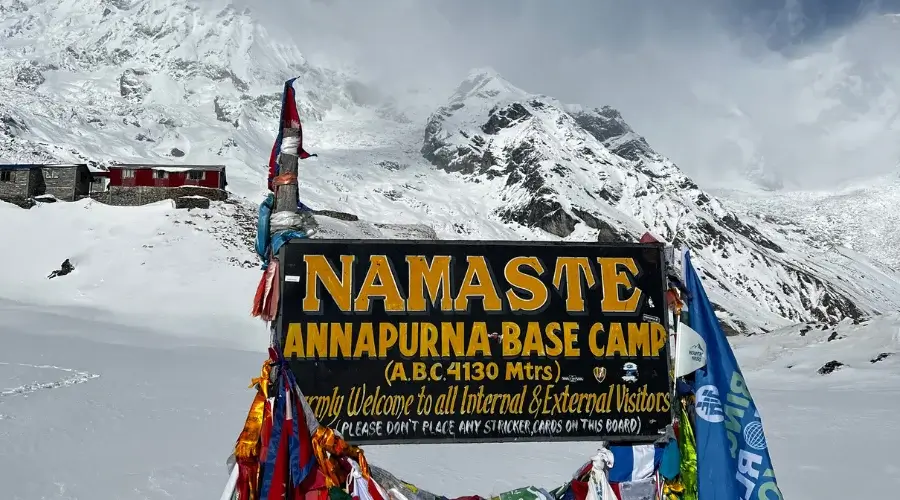
Feedback on Annapurna Base Camp Trek
Please let us know about your travel experience through your feedback/review. Feedback from you will let us know our strong and weak points in improving the service we provide.
Reviews
The Annapurna Circuit in August was a great experience! We were lucky to have clear views, sunny days, and great temperatures while hiking.
From planning to completing the trek, the experience was smooth, and I’ll remember it for a lifetime.
Sandip and the team helped us with the professional booking process, including swift communication and a detailed prep list. Upon our arrival, Rajendra welcomed us at their office, and we went through the trek day by day. He explained the route, which was planned according to the road and weather conditions during the monsoon season.
We then hit the road and met our guide, Dipak, and our lovely porters, Subash and Nobaras, and the real fun started.
Dipak is extremely professional and has years of experience guiding people through this amazing nature. It felt comforting to know that if anything happened to us, he’d be able to help! Thanks for your positive attitude and for guiding us through this trek like a champ, Dipak!
The final thank you goes to our porters. You were amazing, and I couldn’t have completed the trek without you! Subash and Nobaras are the kindest and most humble people. I wish you guys all the best in life!
Himalayan Masters is a company that puts heart and soul into its trips. Its crew is great, and I highly recommend choosing them as a companion for your Nepalese adventures!
Tímea JDenmark 🇩🇰
We have completed the Annapurna Circuit with Himalayan Masters, and it was great! The team assists you with planning and organization from the start, and even if we could only do it in the off-season during the monsoon, they took up the challenge! Trek was excellent and well organized; our guide, Dipak, was the best, funny, and generally great to have around with the “boys,” Sebas and Nabaras! We would not have completed it without them! I can only recommend them for trekking in Nepal!
Jozef KFrance 🇫🇷
We’ve done the Annapurna Circuit trek with our guide, Dipak, and porters Nobaras and Sebas. We had an incredible time, which will be a memorable experience. It is not expected to do this trek during the off-season, but the boys did not hesitate and helped us arrange and experience this trek with us. Each day was very different, and we all got sick at some point. Dipak was always very attentive to and helpful in managing our health issues, so in the end, we all had a fantastic time. We would not have been able to do this without our porters, the lovely guys, and Dipak, without whose humour we would not have gotten too far. Thanks for everything!
Patricia NGermany 🇩🇪
FAQs
How Hard Is Annapurna Base Camp Trek?
The gradual increase in altitude from 1100 meters to 4130 meters during Annapurna Base Camp gives enough time to acclimatize. Although several other challenges come with altitude, and walking on a long path makes the ABC trek moderately hard, all the scenery, diverse flora, fauna, and landscapes, and cultural experience make the hardship worth it.
Is Annapurna Base Camp harder than Everest Base Camp?
What is the culture of the Annapurna Base Camp Trek from Pokhara like?
What’s the difference between Annapurna Circuit Trek and Base Camp Trek?
What’s Mardi Himal Trek vs Annapurna Base Camp Trek?
What is Annapurna Base Camp Trek total distance?
How many days to Trek Annapurna Base Camp?
How long is Annapurna Base Camp Trek from Pokhara?
What’s the Annapurna Base Camp Trek height?
What to pack for Annapurna Base Camp Trek?
Is the Annapurna Base camp trek for 4 days possible?
What is the success rate of Annapurna Base Camp Trek?
Do you need a sleeping bag for Annapurna Trek?
What is the best time to trek to Annapurna Base Camp?
Is ABC Trek for beginners?
Where do you sleep in Annapurna Base Camp?
Which month is best for Annapurna Base Camp?
Is ABC Trek worth it?
What age is appropriate for Annapurna Base Camp?
Can you sleep at Annapurna Base Camp?
Is the Annapurna Base Camp trek crowded?
Can you do the Annapurna base camp trek alone?
What are the key phrases in Nepali I should learn?
How do I stay safe from wildlife?
Can the trek be customized?
Does the ABC Trek package include all the meals?
Is ABC trekking Safe for the Solo Female Trekkers?
Can I choose my own departure Dates for the Annapurna Base Camp Trek?
Are there any internet and shower facilities on the Annapurna Base Camp trek?
Is an oxygen cylinder needed for ABC Trek?
How much additional money do I need per day?
Can I use credit/visa cards in the places I visit during the trek?
Will there be a place to store items/luggage not required for the trek?
Which is harder, Annapurna or K2?
How can I book the ABC trek from Pokhara package?
Speak to an Expert





Sandip Dhungana
Nepal 🇳🇵
Whatsapp: +977-9823636377
Speak to an Expert





Sandip Dhungana
Nepal 🇳🇵
Whatsapp: +977-9823636377


